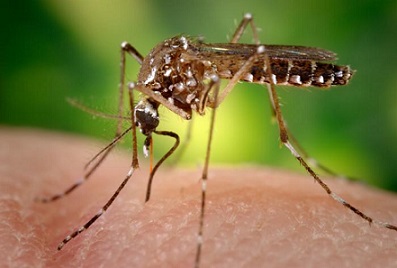Reducing the Mosquito Population
Reducing the mosquito population benefits all birds and mammals, us included. As you well know, not only do mosquitoes transmit heartworms, these pests also carry the malaria virus, Zika virus, West Nile virus and Eastern equine encephalomyelitis virus, among many others.
In part one of this post, I wrote about heartworm prevention and treatment and it's an ongoing battle, as you well know. Sixteen species of mosquitoes, found east of the Mississippi River, have been proven to be natural hosts of (canine) heartworms. That's scary to me.
 Some practical actions that we can take around our homes to significantly reduce mosquito numbers is to eliminate or treat all standing water. Be aware that even tiny puddles of standing water will attract a female mosquito to lay her eggs.
Some practical actions that we can take around our homes to significantly reduce mosquito numbers is to eliminate or treat all standing water. Be aware that even tiny puddles of standing water will attract a female mosquito to lay her eggs.
It's important to look carefully around decks, porches, picnic areas - places where we spend time, for any left behind items that can hold water. Unused trash cans and flower pots should be covered, housed, or thrown away. Make sure water in bird baths and rainwater collecting systems for plants are checked and cleaned weekly.
Clogged gutters and outdoor drains are common harbors of mosquito larva. Check these often. Treat unused swimming pools and water ponds regularly. Keep your grass trimmed, as adult mosquitoes often use tall grass and weeds as hiding and resting spots.
Missing grout in stone porches and walkways may offer just enough space to attract egg-bearing females. Fill missing areas as needed. Make sure window air conditioner units are not draining into standing puddles.
If you have a water garden, the water needs to flow or move to ward off mosquitoes. Pumps, aerators, fountains and falls are examples of water garden additions that will work for this area. Adding fish and frogs to an outdoor water garden also helps.
Flowers like marigolds and geraniums, plants such as citronella and garlic, and herbs like basil and peppermint are thought to repel mosquitoes from the immediate area. So these might be beneficial additions to our landscapes.
For anyone with farm animals that require water troughs, this standing water supply can be treated with bacteria that kills mosquito larva without harming livestock. Check with your local farm store for advice on this. Chances are they will have appropriate products in stock.
Remember that mosquitoes need standing water to hatch but some species lay eggs that can survive for months on dry areas and then will hatch in 24-48 hours if covered with water. So, this requires vigilance on our part during warm months.
We'll likely never win the battle with this pest but we can reduce their numbers significantly by reducing hatching areas.
If you have additional tips on how to safely eliminate this troublesome pest, I'd appreciate hearing them. We'll add them to the list above if appropriate.
See part one of this post, Heartworm Prevention and Treatment.
